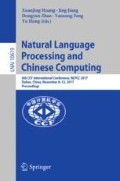Abstract
Readability assessment plays an important role in selecting proper reading materials for language learners, and is applicable for many NLP tasks such as text simplification and document summarization. In this study, we designed 100 factors to systematically evaluate the impact of four levels of linguistic features (shallow, POS, syntactic, discourse) on predicting text difficulty for L1 Chinese learners. We further selected 22 significant features with regression. Our experiment results show that the 100-feature model and the 22-feature model both achieve the same predictive accuracies as the BOW baseline for the majority of the text difficulty levels, and significantly better than baseline for the others. Using 18 out of the 22 features, we derived one of the first readability formulas for contemporary simplified Chinese language.
Access this chapter
Tax calculation will be finalised at checkout
Purchases are for personal use only
Notes
- 1.
- 2.
- 3.
This 18-feature formula and another 22-feature formula not presented in this paper are pending patent application.
References
Feng, L.: Automatic readability assessment. Ph.D. thesis. The City University of New York (2010)
Todirascu, A., et al.: Are cohesive features relevant for text readability evaluation? In: Proceedings of 26th International Conference on Computational Linguistics (COLING 2016), pp. 987–997 (2016)
Sung, Y.T., et al.: Leveling L2 texts through readability: combining multilevel linguistic features with the CEFR. Modern Lang. J. 99(2), 371–391 (2015)
Jiang, Z., et al.: A graph-based readability assessment method using word coupling. In: Proceedings of the 2015 Conference on Empirical Methods on Natural Language Processing (EMNLP 2015), pp. 411–420 (2015)
van Schijndel, M., Schuler, W.: Addressing surprisal deficiencies in reading time models. In: Proceedings of the Workshop on Computational Linguistics for Linguistic Complexity (CL4LC 2016), pp. 32–37 (2016)
Pilán, I., et al.: Predicting proficiency levels in learner writings by transferring a linguistic complexity model from expert-written coursebooks. In: Proceedings of 26th International Conference on Computational Linguistics (COLING 2016), pp. 2101–2111 (2016)
Hancke, J., Vajjala, S., Meurers, D.: Readability classification for German using lexical, syntactic, and morphological features. In: Proceedings of 24th International Conference on Computational Linguistics (COLING 2012), pp. 1063–1080 (2012)
Sato, S., et al.: Automatic assessment of Japanese text readability based on a textbook corpus. In: Proceedings of the 6th Language Resources and Evaluation Conference (LREC 2008), pp. 654–660 (2008)
Yang, S.: A readability formula for Chinese language. Ph.D. thesis. University of Wisconsin–Madison (1970)
荆溪昱.中学国文教材的适读性研究: 适读年级值的推估.教育研究资讯, 第3期 (1995)
Flesch, R.: A new readability yardstick. J. Appl. Psychol. 32(3), 221 (1948)
Gunning, R.: The fog index after twenty years. J. Bus. Commun. 6(2), 3–13 (1969)
Kincaid, J.P., et al.: Derivation of new readability formulas for navy enlisted personnel. Naval Technical Training Command Millington TN Research Branch (1975)
孙汉银. 中文易读性公式, 北京师范大学 (1992)
王蕾, 初中级日韩留学生文本可读性公式初探, 北京语言大学 (2005)
杨金余, 高级汉语精读教材语言难度测定研究, 北京大学 (2008)
左虹,朱勇. 中级欧美留学生汉语文本可读性公式研究. 世界汉语教学 2, 263–276 (2014)
Qiu, L., et al.: Multi-view Chinese treebanking. In: Proceedings of 25th International Conference on Computational Linguistics (COLING 2014), pp. 257–268 (2014)
Acknowledgements
This work was supported by National Social Science Fund (Grant No. 17BGL068). We thank Taipeng Li, Qiuxia Liu, Nankang Liang, Shuying Liu, Jiahao Wei, and workshop participants at Southwestern University of Finance and Economics for their helpful comments and support.
Author information
Authors and Affiliations
Corresponding author
Editor information
Editors and Affiliations
Rights and permissions
Copyright information
© 2018 Springer International Publishing AG
About this paper
Cite this paper
Qiu, X., Deng, K., Qiu, L., Wang, X. (2018). Exploring the Impact of Linguistic Features for Chinese Readability Assessment. In: Huang, X., Jiang, J., Zhao, D., Feng, Y., Hong, Y. (eds) Natural Language Processing and Chinese Computing. NLPCC 2017. Lecture Notes in Computer Science(), vol 10619. Springer, Cham. https://doi.org/10.1007/978-3-319-73618-1_67
Download citation
DOI: https://doi.org/10.1007/978-3-319-73618-1_67
Published:
Publisher Name: Springer, Cham
Print ISBN: 978-3-319-73617-4
Online ISBN: 978-3-319-73618-1
eBook Packages: Computer ScienceComputer Science (R0)

